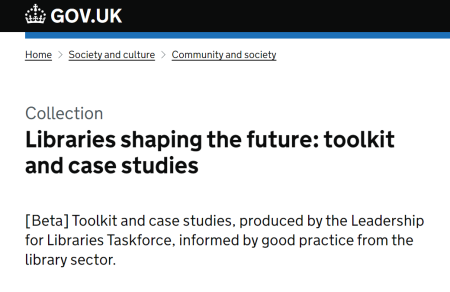ACTIONS
- Protect and safeguard cultural and natural heritage
- Learning and educational opportunities
- Cultural participation/social inclusion
- Sustainable tourism
- Support research
- Employment (recruiting, training, safety)
- Energy consumption, greenhouse gas emissions
- Waste management and reduction
- Transport (forms of, energy use)
- Commercial activities including copyright and IP
- Governance and management
- Security, disaster preparedness, risk reduction
- External partnerships and collaborations
- Publication/report
- Toolkit/framework/roadmap
- Sign-post to other resource (database)
- Case studies
Libraries Shaping the Future Toolkit and Case Studies
- Libraries Taskforce, UK Department for Culture, Media and Sport
“This toolkit, produced by the Libraries Taskforce is the first step in addressing a need identified by the Independent Library Report for England; “that more information needs to be available about the remarkable and vital value that a good library service can offer modern communities of every size and character”.
It sets out how library services can support delivery of a wide range of local and national government priorities. It also describes a range of approaches to delivering cost-effective library services.”
Avaiable in
- English
SDGs LINKAGES
The resource is most closely related to SDGs around effective library services, including 4.4 (staff skills), 9.1 (sustainable infrastructure), 10.2 (universal inclusion), 11.7 (access to safe and welcoming green and public spaces), 16.6 (effective, accountable, transparent institutions), 17.17 (cross-sector partnerships respectively) and 17.19 (non-economic measures of sustainable development). Individual case studies relate to additional SDG targets.
Click on the SDG Target to discover Our Collections Matter indicators
-
Our Collections Matter indicators:
- Number of young people and adults in skills-development activities and programmes drawing on collections, for employment, decent jobs and entrepreneurship.
- Increase in number of young people and adults in such programmes.
- Number and proportion of staff who have received training in the last year, to better support their contribution to the SDGs.
- Programs and processes in place to ensure the availability of a skilled workforce.
-
Our Collections Matter indicators:
- Development of research-useful collections to support reliable, sustainable and resilient use by researchers and others.
- Number and proportion of collections facilities and stores that support economic development and human well-being.
- Number and proportion of collections facilities and stores that provide affordable and equitable access for all.
- Investment in collections facilities.
- Inclusion of collections information in regional and transborder initiatives, notably via digital access for discoverability.
-
Our Collections Matter indicators:
- Collections development to ensure that collections effectively meet the needs of all, irrespective of age, sex, disability, race, ethnicity, origin, religion or economic or other status.
- Number and proportion of educational and participatory programmes that promote participation irrespective of social or other status.
- Numbers and proportions of people making use of collections in relation to the demographic of the local population.
- Numbers and proportions of people involved in focused programmes aimed at promoting social, economic and political inclusion.
- Numbers and proportions of people from different demographic groups involved in decision-making processes relating to collections and collections-based institutions.
- Number and types of partnerships that build relationships with marginalized groups, individuals and communities.
-
Our Collections Matter indicators:
- Numbers of people accessing collecting institutions from different demographic groups, notably women, children, older people and persons with disabilities.
- Increases in numbers of people accessing collecting institutions from different demographic groups.
- Measures taken to remove barriers to access green and public spaces.
- Extent of green space provided by collections institutions.
-
Our Collections Matter indicators:
- Proportion of the population [audience/users/non-users] satisfied with their last experience of public services.
- Access to information, and accountability policies and mechanisms, in place.
- Effective institutional arrangements, both for own working and for working in partnership with other sectors, in place.
- Plans and arrangements in place for extraordinary circumstances such as natural and human-caused disasters.
- Effective arrangements in place to fulfil legal and social obligations and responsibilities.
- Effective arrangements in place for transparent communication and reporting of institutional performance.
- Effective arrangements in place for transparent decision-making and accountability.
-
Our Collections Matter indicators:
- Amount of United States dollars committed to public-private and civil society partnerships.
- Number and/or increase in number, and diversity of local, national and regional multi-stakeholder (public, public-private and civil society) partnerships that address the SDGs drawing on collections, or that otherwise involve collections-based organisations and institutions.
-
Our Collections Matter indicators:
- Identification and implementation of measures for sustainable development incorporating social and environmental considerations.
- Identification and implementation of both quantitative and qualitative measures of sustainable development.

